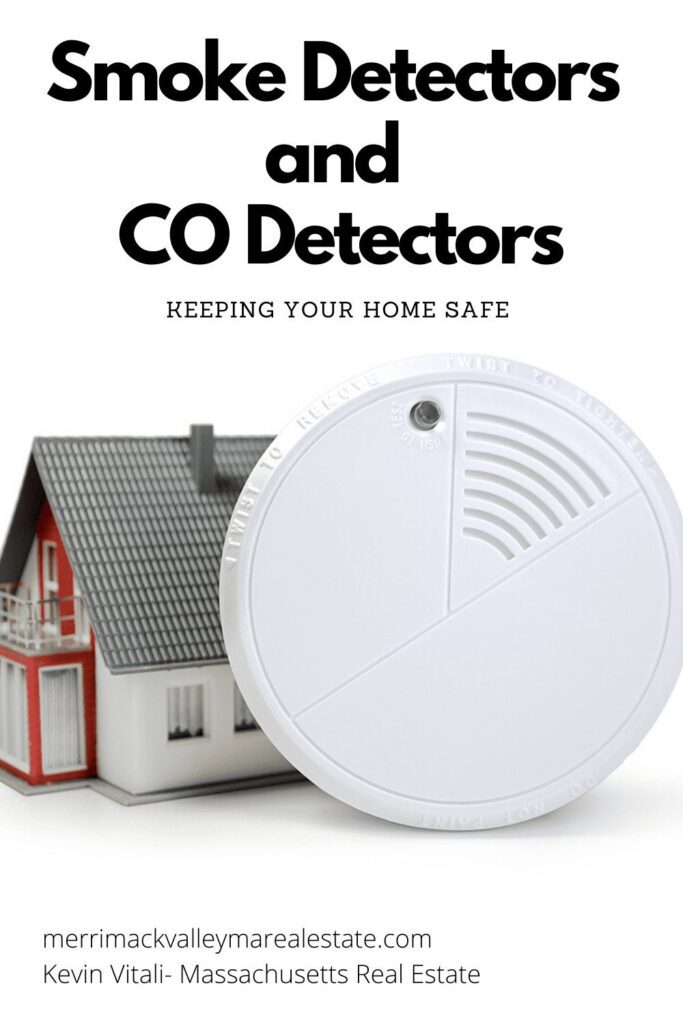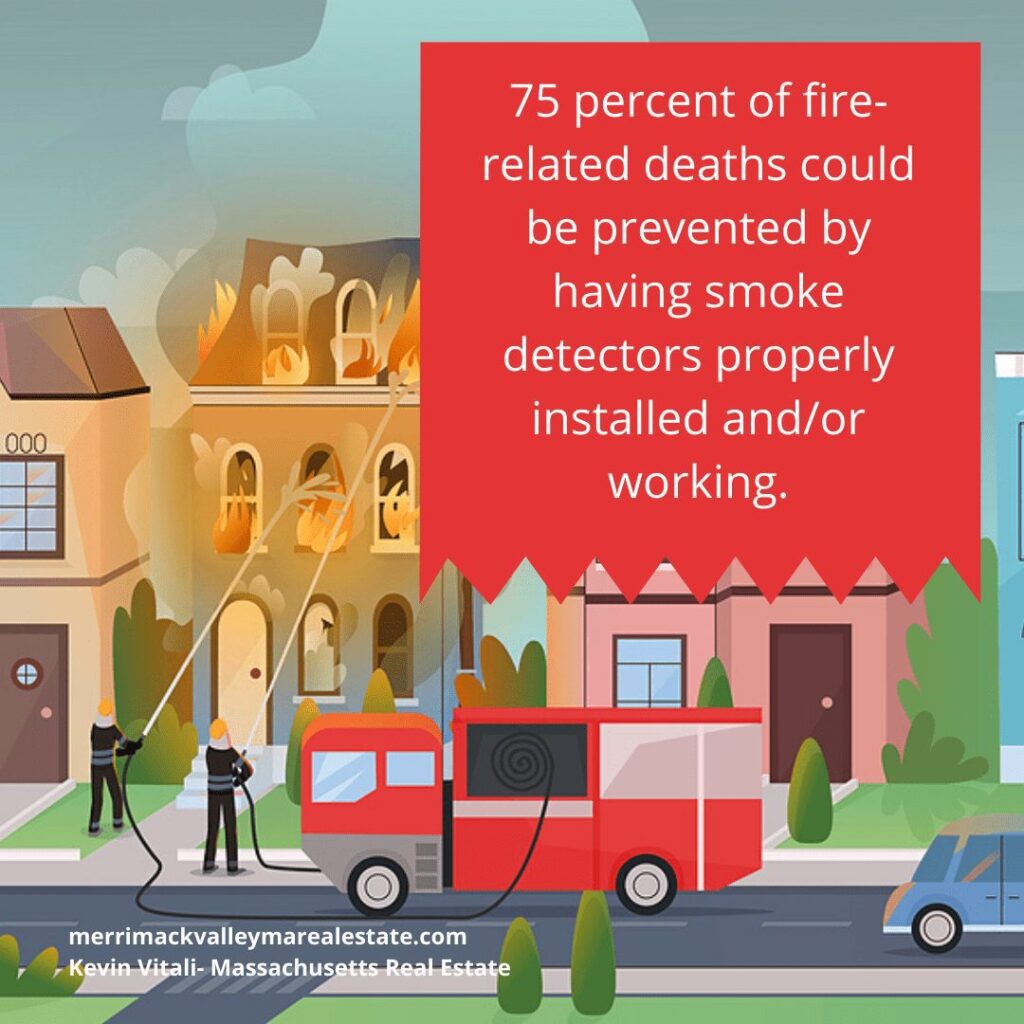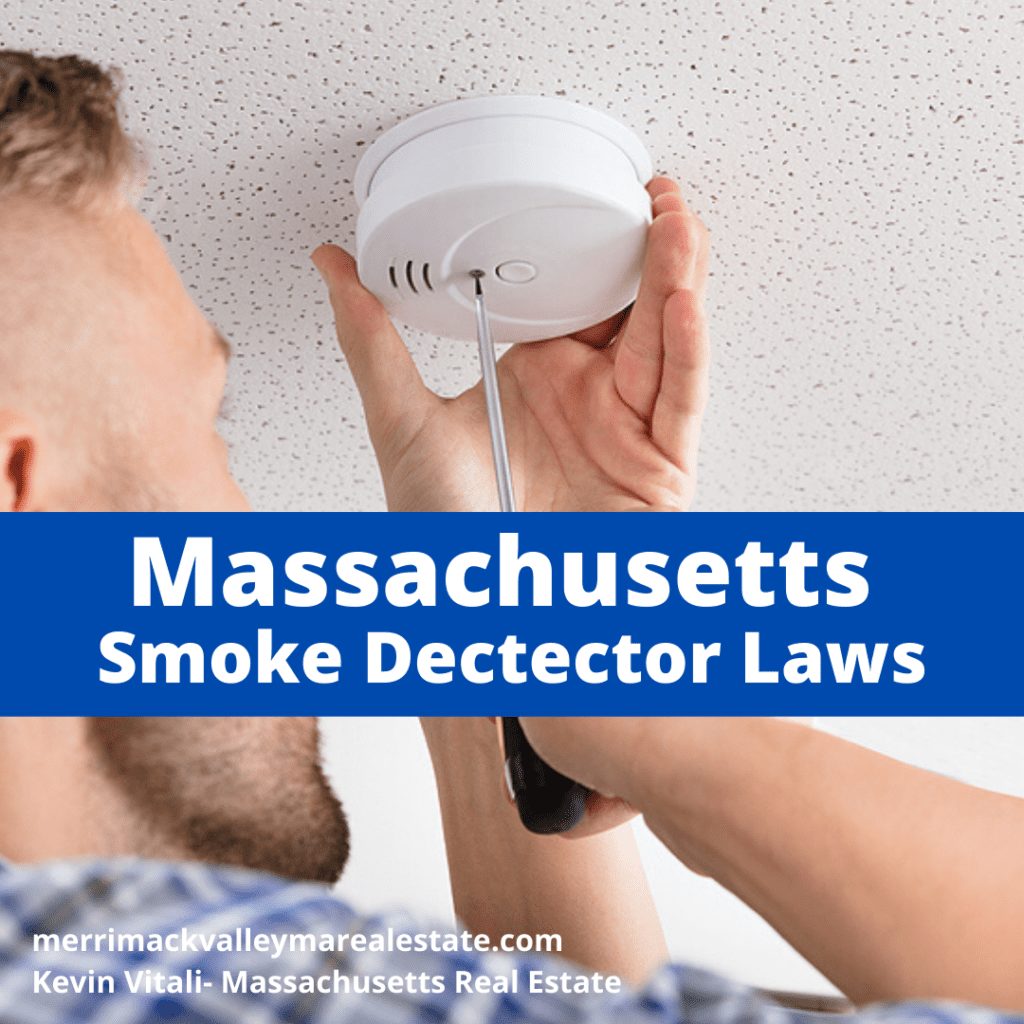
Your home must have properly working Smoke Detectors and Carbon Monoxide Detectors. Doing so provides a level of safety to the members of your household from fire and equipment malfunction, such as your oil burner. Many states, such as Massachusetts, New York, and Rhode Island, require a certificate of compliance before a home sale. The certificate of compliance ensures that your smoke and carbon monoxide detectors are of the right type, placed correctly, and in proper working order.
Other states, like New Hampshire, currently do not have compliance laws requiring installing smoke and carbon monoxide detectors.
But, statistics show that smoke and carbon monoxide detectors save lives. Properly installed and/or working smoke detectors could prevent 75 percent of fire-related deaths.
Many homeowners have the wrong type of smoke or carbon detectors, have disconnected the alarm from the power source or have removed the devices completely. The Massachusetts residential fire safety laws help brings homes back into compliance and is a very simple and cost effective way to save lives in the event of a fire or a carbon monoxide leak.
Massachusetts Certificate of Compliance for Smoke Detectors and Carbon Monoxide Detectors
You must check your state and city smoke and carbon monoxide detector laws. Most cities and towns default to the state’s guidelines, but some towns may have more stringent requirements than the state.
Massachusetts requires a certificate of compliance prior to closing a home. Without the certificate of compliance, your closing will not happen creating a delay and a potential breach of contract.
Many terms, such as smoke certificate, smoke detector permit and certificate of compliance, are used, but they are all the same thing. They refer to the inspection and documentation of properly working fire and carbon monoxide detectors in your home.
Massachusetts Smoke Detector and Carbon Monoxide Detector Laws are ever-changing. If you sold a home a few years ago, brush up on the new laws if you are selling another home. Significant changes to the law could have been made.
Massachusetts Smoke Detector Laws | Massachusetts CO Law
1M.G.L. c 148 s. 26F – The Law Massachusetts General Law, chapter 148 section 26F mandates that upon the sale or transfer of certain homes, the seller must install approved smoke alarms. These requirements apply to residences that were built or modified prior to creation of the Massachusetts State Building Code (January 1, 1975). If a building was built or has undergone renovation, addition or modification after Jan. 1, 1975, the date the building permit was issued determines the smoke alarms requirements of the building code.
Massachusetts General Law, chapter 148 section 26F½ and 527 CMR 1.00:13.7.6 mandates that upon the sale or transfer of any residence, the local fire department must inspect the residence for carbon monoxide alarm compliance. After a successful inspection, the local fire department will issue a Certificate of Compliance indicating that the residence meets the carbon monoxide alarm requirements. Smoke alarm and CO alarm inspections can be conducted in the same visit.
What Do I Need To Do To Get A “Smoke Certificate” in Massachusetts?
Your local fire department needs to schedule an inspection prior to the sale of your home. The department will test both smoke and carbon monoxide detectors to ensure they comply with current local and state smoke detector laws.
If your home’s smoke and carbons are in compliance, a certificate of compliance will be issued on the spot. Put that away and make sure you bring the original to your closing.
What Does A Massachusetts Smoke Detector Certificate Of Compliance Cost?
Most cities and towns charge between $25 and $75 dollars to do the inspection and issue the certificate of compliance. Some towns may require a visit to the Fire Prevention Office to schedule your inspection date while others you can do online or over the phone.
Additionally, plan on potentially having to replace equipment and/ or add additional detectors as required by law. The cost could range from twenty dollars to several hundred dollars depending on how many devices need to be purchased.
If an electrician needs to be hired to help bring you home into compliance expect another three hundred to five hundred dollars more.
Preparing For A Massachusetts Smoke and CO Detector Inspection
-
- Start preparing as soon as you have an accepted offer on your house. If you should fail your first inspection you will have time to make any adjustments and reschedule a new inspection prior to closing.
-
- Determine the age of your home and follow the Massachusetts guidelines for smoke detector and CO detector compliance given the age of your home.
-
- A home built in 1974 will have very different requirements for a home built in 2011. Read the Massachusetts pamphlet correctly.
-
- Determine the age of your home and follow the Massachusetts guidelines for smoke detector and CO detector compliance given the age of your home.
-
- Determine the proper location of your smoke detectors and carbon monoxide detectors. Add the appropriate detectors as needed.
-
- Replace any detectors that are more than 10 years old.
-
- Test to ensure the detectors are all working properly and if they are hardwired they are speaking to each other.
-
- When you believe your home is in compliance schedule call your town’s fire safety office for the soonest appointment they have available.
-
- Again, leave extra time in case you don’t pass your first inspection.
-
- If you have any questions don’t be afraid to ask your fire department.
Some Basics To Know About Smoke Detectors and Carbon Monoxide Detectors
Here are some basics to know about smoke detectors. But to ensure you are preparing properly download the smoke detector pamphlet from your state and town.
Don’t be afraid to ask questions to your fire safety officer. The newer the home the more complex it is. At the end of the day, if the task to prepare your home for your certificate of compliance is daunting, hire a licensed electrician.
Smoke Detectors
-
- If a home was built prior to 1975 it is not required that smoke detectors be hardwired. The smoke detectors are required to have a sealed battery.
-
- After 1975 all smoke detectors must be hardwired.
-
- If one detector in the home is hardwired they all must be hardwired.
-
- A smoke detector must be installed on each habitable level of a home covering up to 1200 square feet.
-
- Depending on the age of the home you will need on working smoke detector outside each sleeping area. After 1997 you are required to have a smoke alarm in each bedroom as well
-
- Any smoke detector that is within 20 feet of a bathroom or kitchen should be photoelectric only.
-
- Each level should have at least one smoke detector placed at the bottom of each staircase on the ceiling.
-
- Detectors should be no more than 10 years old.
Carbon Monoxide Detectors
-
- Carbon Monoxide Detectors can be plug-in with battery backup until 2008. After 2008 they must be hardwired.
-
- Combination alarms should be voice-activated stating whether the emergency is a fire or high carbon monoxide levels.
-
- Carbon Monoxide detectors should be on every inhabitable level as well as the basement.
-
- Carbon Monoxide detectors should be with-in 10 feet of a bedroom.
-
- Detectors should be no more than 10 years old.
Top 5 Reasons You May Fail Your Massachusetts Smoke Detector Inspection
-
- Your equipment is more than 10 years old.
-
- You have the wrong type of detector.
-
- Ionization or combo detectors are not allowed near a kitchen or bath.
-
- Combo detectors must now be voice-activated
-
- Battery only smoke detectors do not have a sealed battery
-
- You have the wrong type of detector.
-
- Improper placement of either your smoke or carbon monoxide detectors.
-
- Batteries backup is not working. Test before the fire department shows up for the inspection!
-
- Detectors have been removed because they were a nuisance and were not reinstalled prior to the inspection.
What is Carbon Monoxide And How Does It Get In My Home?
Carbon monoxide (CO) is a gas that is created from fossil fuels burning. A gas or oil furnace, a wood stove or fireplace, a running car engine, etc…. are all examples of equipment that can produce CO.
When you use the equipment properly and it is functioning correctly it is will not produce dangerous levels of CO in a home. Carbon monoxide gas, like radon gas, is undetectable to the human senses.
If the equipment is malfunctioning or being used improperly it could produce dangerously high levels of Carbon Monoxide. CO poisoning can cause death very quickly.
A few simple low-cost detectors in a home can prevent Carbon Monoxide Poisoning.

Common Questions About Smoke Detectors
Do Smoke Detectors Have to Be Hardwired in Massachusetts?
Any home built after 1975 must have hardwired, interconnected smoke detectors in Massachusetts. Also if significant remodeling has been done in an older home it may be required you upgrade the smoke detection system to be hardwired.
How Many Smoke Detectors Do I Need?
By Massachusetts Law, at a minimum, you need one smoke detector for every1200 square feet of living area and outside each bedroom area. Ideally, you should have one in each bedroom as well. Consult the Guide to Massachusetts Smoke Detector and Carbon Monoxide Detectors to discover the minimum requirements for the age of your home.
How Often Should I Test My Smoke Alarms?
Your smoke alarms should be tested at least once a month. The alarms have a test button to make testing easy.
Who Pays For The Smoke Detector Permit In Massachusetts?
Generally speaking, it is the seller’s responsibility to ensure that all smoke and co are properly installed. It is the seller’s responsibility to obtain the certificate of compliance as well.
In some circumstances, by agreement, the buyer will handle the certificate of compliance.
Where Do I Get The Massachusetts Smoke Detector Pamphlet?
You can download the Guide to Massachusetts Smoke & Carbon Monoxide Requirements here.
Where Can I Buy Smoke Detectors in Massachusetts?
You can purchase smoke detectors at any hardware store, big box home improvement store like Home Depot or an electrical supply house.
Summary
Regardless of whether your state requires a smoke detector certificate of compliance to ensure proper installation and working of a home’s smoke detectors and carbon monoxide detectors, it is a good idea to have your home properly equipped.
Guarantee your family’s safety with a few simple detectors in your home.
If your state requires a certificate of compliance read the rules prior to an inspection to make sure you get in right the first time.
Other Real Estate Resources:
-
- Inviting people you don’t know into your home can occasionally invite trouble as well. Michelle Gibson shares 9 tips to secure your home during showings.
-
- Are accompanied showings a good idea? Bill Gassett emphatically says no. Find out why accompanied showings can hinder a home sale.
-
- Your buyer’s home inspection can be stressful if you’re a home seller. Luke Skar suggests being prepared for an inspection on your home can prevent many small issues from arising.
-
- Today’s home buyers love smart home features. Paul Sian discusses some ways to smarten your home. o





